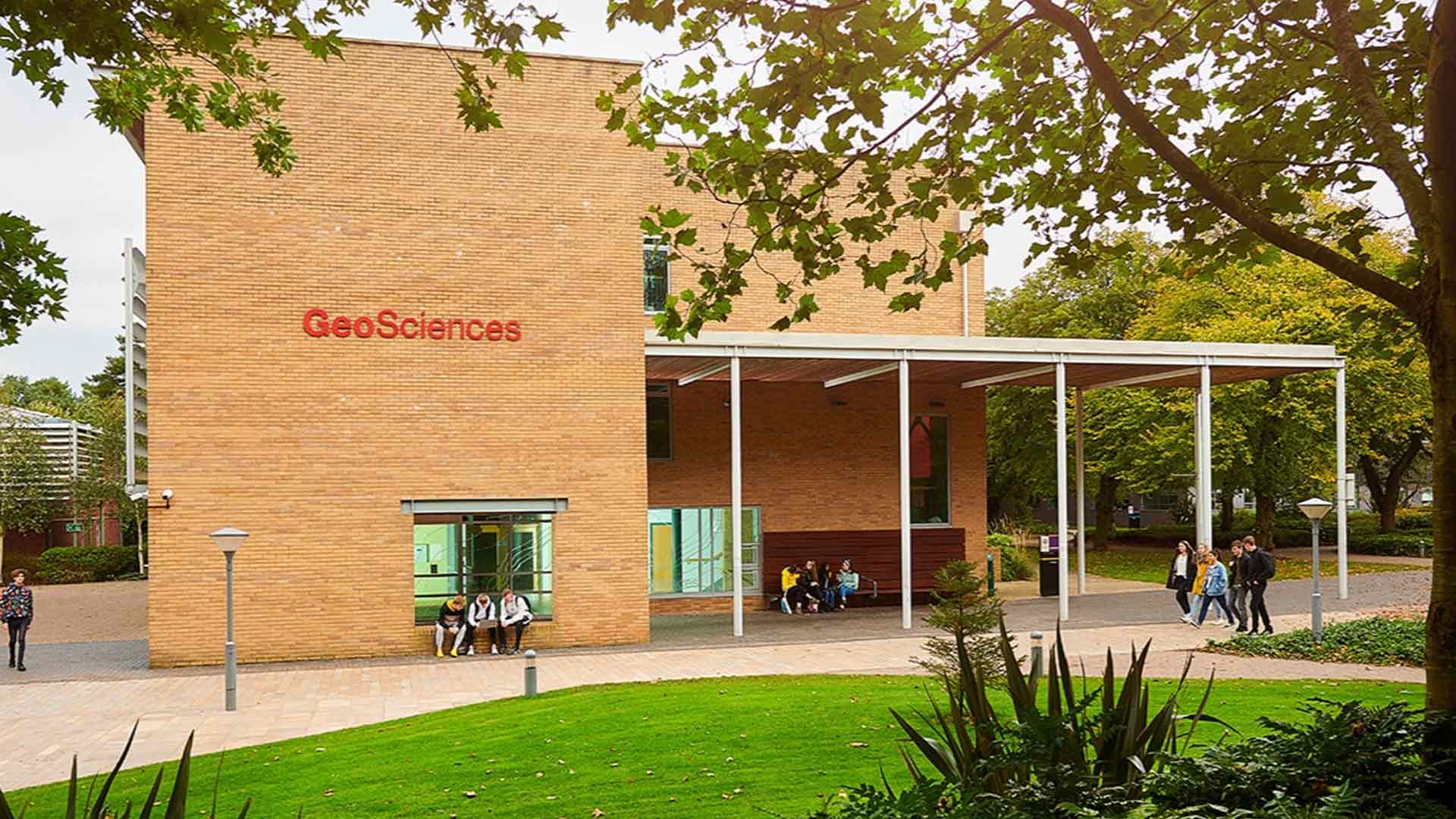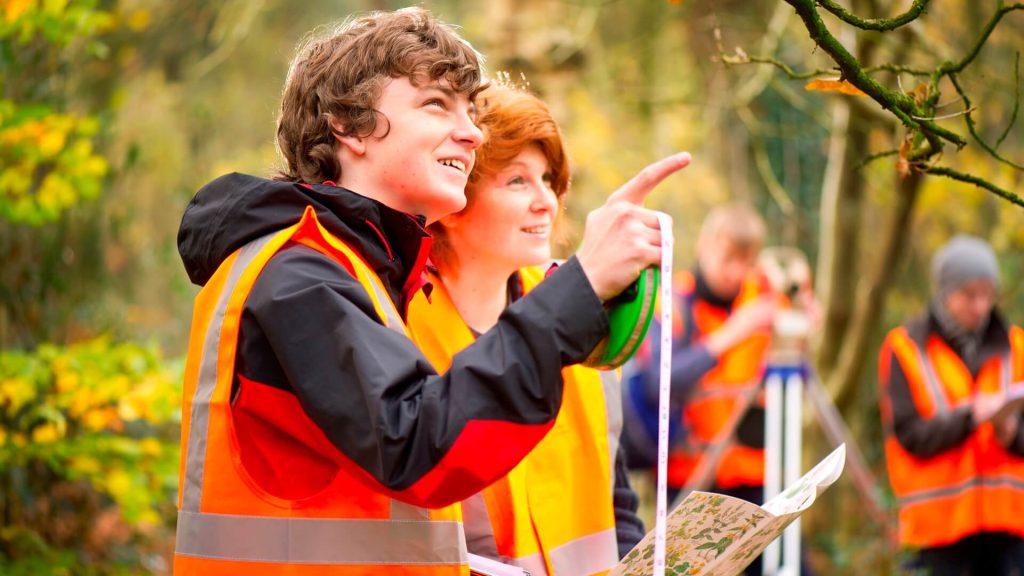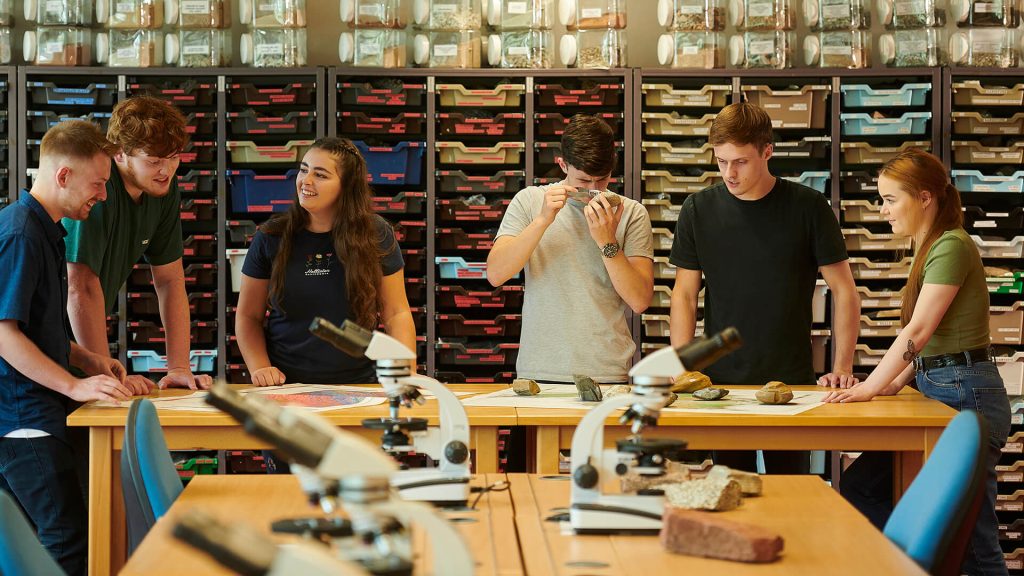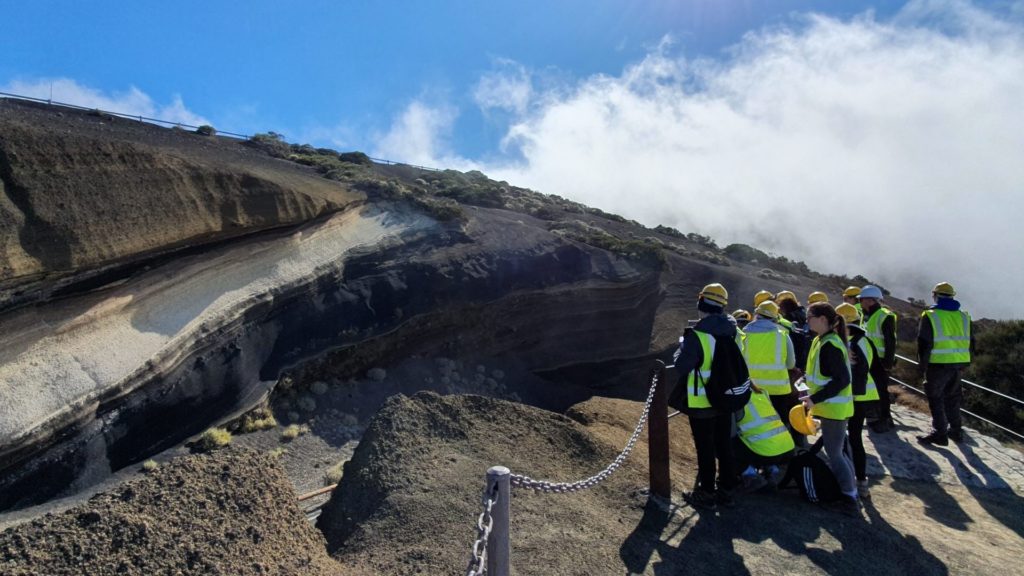Geology with Physical Geography BSc (Hons)
UCAS code: 8T16
Our Geology with Physical Geography degree will introduce you to Earth Sciences and Geology. Join us on adventures across the UK and abroad to complete fieldwork and carry out research in our labs.
Overview
| Course length: | 3 years full-time 6 years part-time |
|---|---|
| Start dates: | September 2024 September 2025 |
| Location: | Edge Hill University |
| Example offers: | BBC-BBB (A Level) or DMM (BTEC) View full entry criteria |
| Subject(s): | Geography and Geology |
| Faculty: | Arts and Sciences |
| Department: | History, Geography and Social Sciences |

Over millions of years geological processes have shaped and influenced the planet we live on. This degree will guide and instruct those who are passionate about the Earth and its geology.
You’ll take part in national and international fieldwork to learn about hard- and soft-rock geology, before the focus shifts to Applied Geology during the last year of the degree. Top ten in the UK for Teaching on my Course (National Student Survey 2023 – Environmental Sciences), you’ll also explore topics like landscape dynamics, climate and environmental change, and natural hazards. Fieldwork destinations across the UK and Europe will provide an essential practical dimension to your degree. Previous locations have included Edinburgh, Tenerife and the Scottish Highlands. You can also tailor your degree to your interests, with the opportunity to select subject-specific and complementary modules.
After three years of study, you’ll have honed many transferable skills useful for working in public and private sector organisations. You might consider roles in conservation, geological exploration, environmental management or environmental education. To help you plan for life after Edge Hill, our tailored careers and employability activities can help you identify and make your next move.
Course features
-
Fieldwork
-
Sandwich year option available
-
Studying abroad option available
-
International students can apply
-
Learn a language option available
What you'll study
This is your introduction to a broad range of geological and geographical topics. There’s a strong emphasis on laboratory work, and you’ll develop skills in field mapping, rock and fossil identification, and petrography.
In your second year you’ll explore more specialist topics like Igneous and Metamorphic Petrology, Structural Geology and Sedimentology. There’s a comprehensive fieldwork programme, and a residential field-based geological mapping project at the end of the year.
Immerse yourself in Applied Geology, Geo-environmental Engineering, and Geo-environmental Management, and make the most of the industry-standard equipment at your disposal. Choose additional topics from a range of specialist modules, including natural hazards and environmental change.
Where your course includes optional modules, these are to provide an element of choice within the course curriculum. The availability of optional modules may vary from year to year and will be subject to minimum student numbers being achieved. This means that the availability of specific optional modules cannot be guaranteed. Optional module selection may also be affected by timetabling requirements. Some restrictions on optional module choice or combinations of optional modules may apply.
How you'll study
Teaching is through lectures, fieldwork, practical activities, lab work, tutorials, dissertation supervision, and directed independent learning. We place an emphasis on strengthening the employability of our graduates through the acquisition of a range of subject-specific and transferable skills, as well as the development of knowledge and understanding.
Fieldwork is one of the most beneficial and enjoyable aspects of this degree. Current fieldwork locations include Edinburgh, Tenerife, and the Scottish Highlands. You’ll also enjoy field trips to local sites.
How you'll be assessed
Methods of assessment display your knowledge and understanding and develop and demonstrate your competence in subject-specific and key skills. All modules are assessed by either coursework only or a mixture of coursework and examination. Coursework typically includes practical portfolios, essays, project reports, field-related materials (such as maps and notebooks), individual and group oral presentations, and poster presentations.
Who will be teaching you
A core of widely experienced geologists and physical geographers with extensive research and consultancy experience support the delivery of the programme, with additional contributions from industry-based practitioners.
Entry criteria
Entry requirements
Typical offer 112-120 UCAS Tariff points, including Geography, Geology, Environmental Science or a related subject. GCSE Mathematics at Grade C or Grade 4 or above, or Adult Numeracy at Level 2 or above, or equivalent, is also required.
Example offers
| Qualification | Requirement |
|---|---|
| A Level | BBC-BBB. |
| BTEC Extended Diploma (or combination of BTEC QCF qualifications) | Distinction, Merit, Merit (DMM). |
| T Level | Overall grade of Merit. |
| International Baccalaureate (IB) | We are happy to accept IB qualifications which achieve the required number of UCAS Tariff points. Subject-specific requirements at Higher Level (HL) Grade 5 may apply. |
| Access to Higher Education Diploma | 45 credits at Level 3, for example 15 credits at Distinction and 30 credits at Merit or 24 credits at Distinction and 21 credits at Merit. The required total can be attained from various credit combinations. |
Please note, the above examples may differ from actual offers made. A combination of A Level and BTEC awards may also be accepted.
If you have a minimum of two A Levels (or equivalent), there is no maximum number of qualifications that we will accept UCAS points from. This includes additional qualifications such as Extended Project Qualification (EPQ), AS Levels that haven't been continued to A Level, and General Studies AS or A Level awards.
English language requirements
International students require IELTS 6.0, with a score no lower than 5.5 in each individual component, or an equivalent English language qualification.
If your current level of English is half a band, one band, or one-and-a-half bands lower, either overall or in one or two elements, you may want to consider our Pre-Sessional English course.
How to apply
Apply full-time
Read our guide to applying through UCAS to find out more about the application process.
International
Please see our international student pages for further information about how to apply as a prospective international student.
Part-time applications require a direct application to Edge Hill. Please select the year of entry that you wish to apply for.
Should you accept an offer of a place to study with us and formally enrol as a student, you will be subject to the provisions of the regulations, rules, codes, conditions and policies which apply to our students. These are available at www.edgehill.ac.uk/studentterms.
If you join a full time undergraduate degree at Edge Hill University, we will guarantee you the offer of a room in our halls of residence for the first year of your course.
Discover our accommodation
Facilities
 The Department of History, Geography and Social Sciences is based in the Geosciences building. The contemporary facilities combine with a friendly and supportive learning environment to ensure that your studies are a rich and rewarding experience.
The Department of History, Geography and Social Sciences is based in the Geosciences building. The contemporary facilities combine with a friendly and supportive learning environment to ensure that your studies are a rich and rewarding experience.
The GeoSciences building features a large lecture theatre, small group teaching rooms, IT facilities and smaller tutorial spaces. There is also a large social area which encourages a more informal and interactive style of learning.
Where you'll study
GeoSciences
Finance
Tuition fees
UK Full-Time
£9,250
a year
UK Part-Time
£77 per credit
for 360 credits
International
£16,500
a year
EU/EEA and Swiss students who have settled or pre-settled status under the EU Settlement Scheme, as well as Irish nationals, may be eligible for the UK tuition fee rate.
Financial support
Subject to eligibility, UK students joining this course can apply for a Tuition Fee Loan from the Government to cover the full cost of tuition fees. UK students enrolling on the course may also be eligible to apply for additional funding to help with living costs.
Please view the relevant Money Matters guide for comprehensive information about the financial support available to eligible UK students.
EU/EEA and Swiss students who have settled or pre-settled status under the EU Settlement Scheme may be eligible to apply for financial support. Irish nationals can ordinarily apply to Student Universal Support Ireland (SUSI). If you are an EU student who does not have settled or pre-settled status, or are an international student from a non-EU country, please see our international student finance pages.
Your future career
You’ll end the course with plenty of subject-specific and transferable skills, and be a real asset to public and private sector organisations. Our graduates have job titles like engineering geologist, geotechnical engineer, environmental consultant and GIS technician, working for companies including:
- WSP
- Jacobs
- AECOM
- Balfour Beatty
- Wardell Armstrong LLP
Wondering where you could work? Organisations like United Utilities, the Environment Agency, DEFRA and OXFAM regularly recruit graduates with a geoscience degree.
Another option you may want to explore is postgraduate study. This allows you to research an aspect of geology and geography that particularly interests you. After completing this degree, our graduates have also undertaken postgraduate training in engineering geology, GIS, or teaching.
Course changes
Every effort has been made to ensure the accuracy of this information, however our courses are subject to ongoing review and development. Changing circumstances may necessitate alteration to, or the cancellation of, courses.
Changes may be necessary to comply with the requirements of professional bodies, revisions to subject benchmarks statements, to keep courses updated and contemporary, or as a result of student feedback. We reserve the right to make variations if we consider such action to be necessary or in the best interests of students.











